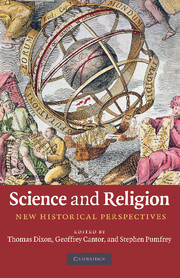Book contents
- Frontmatter
- Contents
- List of contributors
- Preface
- 1 Introduction
- PART I CATEGORIES
- PART II NARRATIVES
- PART III EVOLUTION AND CREATIONISM
- PART IV THE POLITICS OF PUBLISHING
- PART V WAYS FORWARD
- 12 Sciences and religions: what it means to take historical perspectives seriously
- 13 Simplifying complexity: patterns in the history of science and religion
- 14 What shall we do with the ‘Conflict Thesis’?
- Select bibliography
- Index
13 - Simplifying complexity: patterns in the history of science and religion
Published online by Cambridge University Press: 05 May 2010
- Frontmatter
- Contents
- List of contributors
- Preface
- 1 Introduction
- PART I CATEGORIES
- PART II NARRATIVES
- PART III EVOLUTION AND CREATIONISM
- PART IV THE POLITICS OF PUBLISHING
- PART V WAYS FORWARD
- 12 Sciences and religions: what it means to take historical perspectives seriously
- 13 Simplifying complexity: patterns in the history of science and religion
- 14 What shall we do with the ‘Conflict Thesis’?
- Select bibliography
- Index
Summary
In 1991 John Hedley Brooke launched what I have dubbed the ‘complexity thesis’ in a review of his landmark book Science and religion: Some historical perspectives, the most important contribution to the historiography of the field since the appearance of Andrew Dickson White's History of the warfare of science with theology in Christendom nearly a century earlier. Avoiding the simplistic formulas of the past, Brooke revelled in the rich complexity and diversity of interplay between science and Christianity. He described a thoroughly entangled relationship, with religious beliefs not only providing ‘presupposition, sanction, even motivation for science’ but also regulating ‘discussions of method’ and playing ‘a selective role in the evaluation of rival theories’. As all right-thinking historians of science and religion now concede, he was correct. But he left many feeling emotionally and intellectually unsatisfied, because, to be blunt, Brooke's complexifying history seems to have little to recommend it besides its truth.
John Brooke is a self-described historical voyeur. ‘I like to stand back from the heated polemics’, he confesses, ‘and examine the enormous diversity and richness in the debate’. Fortunately for him he does not suffer this vice in isolation. Thus he has avoided the fate of many scholars who eschew notoriety for insight and accuracy. Not long ago one American intellectual suggested that ‘Historians who offer “multicausal explanations” – and use phrases like that – do not last, while those who discover the hidden wellspring of absolutely everything are imitated and attacked but never forgotten’.
- Type
- Chapter
- Information
- Science and ReligionNew Historical Perspectives, pp. 263 - 282Publisher: Cambridge University PressPrint publication year: 2010
- 11
- Cited by

